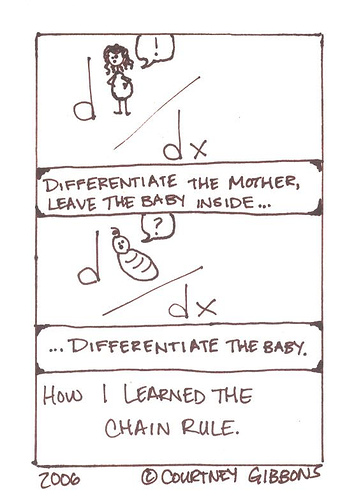I never really liked using the terms "inside" and "outside" functions anyway. Maybe because you can decompose functions in an infinite number of ways, and those terms, to me, imply that there is only one inside and one outside function possible. I don't know. Maybe I'm being too picky. But, I kind of liked the mother/baby analogy. And my kids LOVED it. It's hilarious when someone walks in and my kids are muttering, "Ok, now differentiate the baby..."
*****
I'm pretty sure I haven't posted this before, but here's a worksheet for practicing the chain rule. My textbook doesn't have a lot of these types of problems (actually, I don't think it has any), but AP Calc students (well, I think all calc students...) need to learn to recognize that the chain rule is required to differentiate functions in the form of y=f(g(x)), even when f and and g are not explicitly defined.
It looks like there's four pages here, but it's really just two (I print two pages to a sheet so that they'll fit in students' composition notebooks). The second page gives practice with functions defined by a table.
Here ya go!
*****
One more note on chain rule. When we have a trig function raised to a power, such as y=sin^2(x), I encourage (read make) my students rewrite the function as y=[sin(x)]^2. This makes it much easier for them to identify the mom (x^2) and the baby (sin(x)). I try to start this habit in PreCalc so that it's second nature by the time they see it again in Calculus.
And that's that. Chain rule...I'm getting a little better at it. Slowly but surely.

I'd love to use this with my class, but don't have a Scrib'd membership, and need to edit it slightly. Would you be willing to send me a copy? Thanks for considering!
ReplyDeleteSara
selsnick@gmail.com
Sent! :)
DeleteChain connect fencing is more established than you may might suspect - the procedure was first created by a UK producing organization around the 1840s, in light of material weaving machines.chain link fence Abbotsford
ReplyDeleteThe Meghalaya Board of School Education has issued the MBOSE SSLC Question Paper 2022. The board distributes MBOSE class 10 question papers in pdf format for English, Mathematics, Science & Technology, Computer Science, Hindi, and other courses Meghalaya 10th Question Paper 2022 Candidates should download and practise these prior year question papers in order to gain an understanding of the test pattern, such as the types of questions that will be asked, the marking scheme, and so on.
ReplyDelete